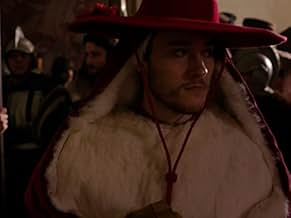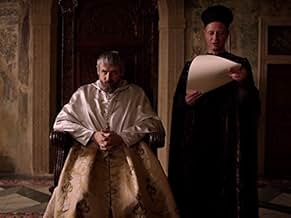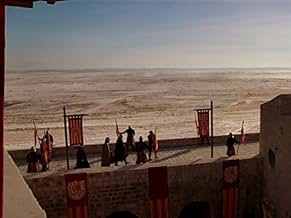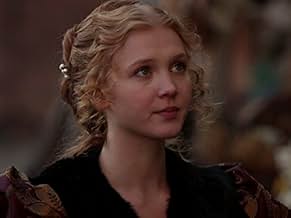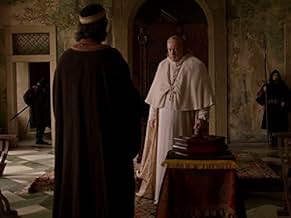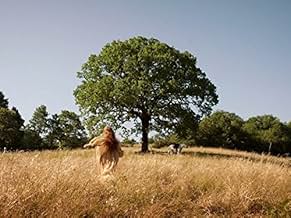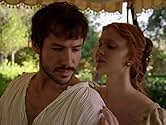Histoire de la montée en puissance et de la chute de la dynastie de la Renaissance.Histoire de la montée en puissance et de la chute de la dynastie de la Renaissance.Histoire de la montée en puissance et de la chute de la dynastie de la Renaissance.
- Récompenses
- 2 victoires et 8 nominations au total
Parcourir les épisodes
Avis à la une
Feels like a cousin to the shows Rome and that Blood and Sand gladiator series. Historical drama with an extra helping of violence and sex!
Like others I was a bit dismayed at hearing a NY accent surrounded by European accents by all other characters. However, after 2 episodes I didn't even notice. The role of Rodrigo was not a perfect casting, but not far off the mark.
It plays as a man between the cloth, love, ambition, and inadequacy. This is not the tragic Shakespearean archetype, but more of an Everyman struggling with life and politics in his 50s. He wants to do good, but got to where he is by doing whatever he could - good or bad. The occasional screams or fist pumps work well to illustrate the point, in my opinion.
The rest of the cast were fine with a beautiful Lolitaesque Lucrecia being a highlight. I would have proffered a more Latin looking Cesare but the actor was not horrible all said and done.
Lastly for fans of Assassins Creed video game, it's amazing to see Rome look remarkably close to the game. From the houses to the costumes, to the hills. In a scene where Cecere scales Castel Sant Angelo - it was déjà vu!
Like others I was a bit dismayed at hearing a NY accent surrounded by European accents by all other characters. However, after 2 episodes I didn't even notice. The role of Rodrigo was not a perfect casting, but not far off the mark.
It plays as a man between the cloth, love, ambition, and inadequacy. This is not the tragic Shakespearean archetype, but more of an Everyman struggling with life and politics in his 50s. He wants to do good, but got to where he is by doing whatever he could - good or bad. The occasional screams or fist pumps work well to illustrate the point, in my opinion.
The rest of the cast were fine with a beautiful Lolitaesque Lucrecia being a highlight. I would have proffered a more Latin looking Cesare but the actor was not horrible all said and done.
Lastly for fans of Assassins Creed video game, it's amazing to see Rome look remarkably close to the game. From the houses to the costumes, to the hills. In a scene where Cecere scales Castel Sant Angelo - it was déjà vu!
This show is probably confusing a lot of people. Showtime just did "The Borgias" with Jeremy Irons, but this isn't it. It is an original production by Canal+, which appears to be like a European version of HBO.
Despite being made by a French company, the show is totally in English, and stars an American. What's most surprising, though, is how tame the Showtime series seems in comparison to this.
Despite being on "Premium Cable" in America, the Showtime series is very TV-14. The violence is tame, the sex is mainly suggested, and there is very little foul language. A few cuts and it could easily air on any network in the US.
"Borgia", on the other hand, feels much more like HBO's groundbreaking series "Rome". The violence is brutal, graphic and unflinching. Sex is frequent, full frontal nudity a matter of fact. I suspect this is an authentic depiction of life in Rome around 1500.
Speaking of "Rome", the first thing I noticed, besides visual similarities, is that Anne Thomopolous is an executive producer. That name seemed very familiar, and sure enough, she was one of the producers of "Rome". I'd call that a good sign.
She's not alone in the behind the scenes talent, two other noteworthy names pop up: Tom Fontana and Barry Levinson. Levinson is a well known Hollywood director, with credits like "Rain Man" and "Sleepers". Fontana is the creator of HBO's "OZ", the first hour long drama produced by that company. One might argue that Fontana invented the "R-rated premium cable TV series" that is so popular now. He paved the way for stuff like The Wire, Rome, Dexter, and The Sopranos.
That's a pretty big talent line up for a European TV series. In terms of name actors, however, this show unfortunately can't compete with Showtime. They have Jeremy Irons playing Borgia, where this show has John Doman.
Doman is a good character actor, and his performance as the sarcastic, mean-spirited police captain in "The Wire" is legendary. That said, he feels very out of place in this otherwise extremely authentic looking show, mainly due to his unapologetic American accent. It's like Kevin Costner as Robin Hood, the producers apparently just decided to suspend disbelief and dump a modern American accent in the middle of the Vatican. You get used to it, but it's a little off-putting at the start.
The kid playing Cesare Borgia is capable, but there are times he seems to be pushing into melodrama territory, particularly any time he gets angry. The guy in the Showtime series was cool as a cucumber, yet viscous and brooding at the same time.
The men at least aren't up to Showtimes standards, but the women are a different story. Lucrezia and Julia Farnese are both much better in this show than Showtime's. Julia is a total sex goddess in this, someone who is used to getting her way by any means necessary. And Lucrezia is her young counterpart, inexperienced but curious. The two women both nail the parts and are totally convincing, more so than the depictions of these characters on Showtime.
I recognized a few other actors, most notably the actor who plays Samwell Tarly in HBO's "Game of Thrones" as a young Cardinal. The "bit parts" are played by unknown Europeans, and are usually great.
I won't spoil the plot, but it is basically the same as "The Borgias": The rise to power of a corrupt pope and his family. Of course, is it based on actual history, so spoilers are easy to come by if you want them. The main difference between the plotting of this show and the Showtime version is that this show manages to remain interesting all the time, where I felt it was somewhat of a struggle to get through the Showtime series. I just didn't care about anyone except Cesare and Rodrigo in the Showtime version, all the other characters were boring.
This version places lesser characters like Julia Farnese and Juan Borgia in the limelight as well, so we actually spend time with them away from the Pope. Additionally, the Showtime series concentrated on the Pope's arch enemy Della Rovre to a much greater degree, where this show seems focused on the family and their friends. I find that to be much more effective, since the enemy is now viewed through their eyes only, the audience is essentially placed on the Borgia side of the table permanently. It's like you're part of the family.
I would highly recommend this to any fan of historical drama, with a special emphasis on HBO's "Rome". This is almost like an unofficial successor to it, it has the same feel of authenticity.
"Borgia" is available on Netflix instant watch, and as far as I know this is currently the only way to see it in the US.
Despite being made by a French company, the show is totally in English, and stars an American. What's most surprising, though, is how tame the Showtime series seems in comparison to this.
Despite being on "Premium Cable" in America, the Showtime series is very TV-14. The violence is tame, the sex is mainly suggested, and there is very little foul language. A few cuts and it could easily air on any network in the US.
"Borgia", on the other hand, feels much more like HBO's groundbreaking series "Rome". The violence is brutal, graphic and unflinching. Sex is frequent, full frontal nudity a matter of fact. I suspect this is an authentic depiction of life in Rome around 1500.
Speaking of "Rome", the first thing I noticed, besides visual similarities, is that Anne Thomopolous is an executive producer. That name seemed very familiar, and sure enough, she was one of the producers of "Rome". I'd call that a good sign.
She's not alone in the behind the scenes talent, two other noteworthy names pop up: Tom Fontana and Barry Levinson. Levinson is a well known Hollywood director, with credits like "Rain Man" and "Sleepers". Fontana is the creator of HBO's "OZ", the first hour long drama produced by that company. One might argue that Fontana invented the "R-rated premium cable TV series" that is so popular now. He paved the way for stuff like The Wire, Rome, Dexter, and The Sopranos.
That's a pretty big talent line up for a European TV series. In terms of name actors, however, this show unfortunately can't compete with Showtime. They have Jeremy Irons playing Borgia, where this show has John Doman.
Doman is a good character actor, and his performance as the sarcastic, mean-spirited police captain in "The Wire" is legendary. That said, he feels very out of place in this otherwise extremely authentic looking show, mainly due to his unapologetic American accent. It's like Kevin Costner as Robin Hood, the producers apparently just decided to suspend disbelief and dump a modern American accent in the middle of the Vatican. You get used to it, but it's a little off-putting at the start.
The kid playing Cesare Borgia is capable, but there are times he seems to be pushing into melodrama territory, particularly any time he gets angry. The guy in the Showtime series was cool as a cucumber, yet viscous and brooding at the same time.
The men at least aren't up to Showtimes standards, but the women are a different story. Lucrezia and Julia Farnese are both much better in this show than Showtime's. Julia is a total sex goddess in this, someone who is used to getting her way by any means necessary. And Lucrezia is her young counterpart, inexperienced but curious. The two women both nail the parts and are totally convincing, more so than the depictions of these characters on Showtime.
I recognized a few other actors, most notably the actor who plays Samwell Tarly in HBO's "Game of Thrones" as a young Cardinal. The "bit parts" are played by unknown Europeans, and are usually great.
I won't spoil the plot, but it is basically the same as "The Borgias": The rise to power of a corrupt pope and his family. Of course, is it based on actual history, so spoilers are easy to come by if you want them. The main difference between the plotting of this show and the Showtime version is that this show manages to remain interesting all the time, where I felt it was somewhat of a struggle to get through the Showtime series. I just didn't care about anyone except Cesare and Rodrigo in the Showtime version, all the other characters were boring.
This version places lesser characters like Julia Farnese and Juan Borgia in the limelight as well, so we actually spend time with them away from the Pope. Additionally, the Showtime series concentrated on the Pope's arch enemy Della Rovre to a much greater degree, where this show seems focused on the family and their friends. I find that to be much more effective, since the enemy is now viewed through their eyes only, the audience is essentially placed on the Borgia side of the table permanently. It's like you're part of the family.
I would highly recommend this to any fan of historical drama, with a special emphasis on HBO's "Rome". This is almost like an unofficial successor to it, it has the same feel of authenticity.
"Borgia" is available on Netflix instant watch, and as far as I know this is currently the only way to see it in the US.
10mjahnl
I read reviews complaining about the historical accuracy and actor's accents. Keep the following in mind:
If I wanted to watch a show based on historical facts, produced with utmost accuracy, I'd watch a documentary. Borgia has a historical base, but otherwise, it is just a dramatical account of a time period. Credit to the film crew, though; I do find the majority of the set decorations to blend very well with the storyline, giving the viewer a sense of accuracy.
The actor's accents: I don't have a problem with any accent. If I expected the delivery of each individual's accent based on their historical origin, in keeping with the English spoken at that time, which was also not a world language as it is today, 99% of the viewers wouldn't understand but 25% of the verbal interaction. Frankly, the differences in accents do stand out, but they are not distracting. I rather have an actor stay with his/her natural accent, than pretending to be from somewhere else, and then receiving criticism for their inaccuracies.
The acting abilities: Unless your name is Kevin Spacey (House of Cards) or you're some other high end Hollywood hotshot, I don't expect anyone to deliver Oscar worthy performances. Small inaccuracies are to be expected, especially given that this is a comparatively small production that works on a shoestring budget. Hollywood has deeper coffers and more A-listers. A few things do stand out, though: Doman's portrayal of Pope Alexander is well done. A man caught up in his own desire to rise above and finding the ability to do so at all cost. He is caught between being a man, while having to be a pope. Who wouldn't struggle? He does well, just as long as he doesn't have to reach too deep into the character tool chest, and draw from deep emotions. He plays the sexual deviant better than the irate villain, and the irate villain better than a person who finds his own physical limitations. (You'll get what I mean, once you see it)
Ryder's performance on Cesare is rather consistent. He's consistently acting well, especially when the performance comes to showing the higher-than-though attitude. He's also consistently overly dramatic when it comes to displaying deep rooted anger. Overall, I think he does well, and I'm having fun watching him move through the show.
The ladies are all very well played. However, with the exception of Isolda Dychauk (Lucrezia), none of the female cast has to reach too deep into the emotional side of acting. Dychauk is a pleasure to watch, though. She's coming across rather believable.
Sex: Being European, I do find it amusing that some of the American viewers get offended by breasts and genitalia. Newsflash, folks. It's human nature. If you don't like to see it, just don't watch the show, or turn your head. I have yet to see an overabundance of skin on this show. The moments when sexual acts were displayed was in keeping with the storyline, and never gave me the impression as if the writers thought: "Well, we're losing momentum here, let's show some breasts...".
Church/Religion: What I find most amusing, is that the Catholic Church is portrayed as corrupt, self serving, political, war mongering, sexually deviant and utterly repulsive; especially when it comes to the matter of portraying itself as pure, innocent and true. Following the books of history, one can only conclude that not much has changed over the centuries. (Side note; by denomination, I am Roman Catholic myself)
Overall, I find Borgia to be quite entertaining and worthy of one's time. Watch it with a grain of salt and don't take the show as a historically accurate account of the people of Rome. However, do watch the show with an underlying interest in inter-Church politics, greed and capitalistic tendencies. Then, transpose your findings onto the church(es) of today. See what your findings are...
If I wanted to watch a show based on historical facts, produced with utmost accuracy, I'd watch a documentary. Borgia has a historical base, but otherwise, it is just a dramatical account of a time period. Credit to the film crew, though; I do find the majority of the set decorations to blend very well with the storyline, giving the viewer a sense of accuracy.
The actor's accents: I don't have a problem with any accent. If I expected the delivery of each individual's accent based on their historical origin, in keeping with the English spoken at that time, which was also not a world language as it is today, 99% of the viewers wouldn't understand but 25% of the verbal interaction. Frankly, the differences in accents do stand out, but they are not distracting. I rather have an actor stay with his/her natural accent, than pretending to be from somewhere else, and then receiving criticism for their inaccuracies.
The acting abilities: Unless your name is Kevin Spacey (House of Cards) or you're some other high end Hollywood hotshot, I don't expect anyone to deliver Oscar worthy performances. Small inaccuracies are to be expected, especially given that this is a comparatively small production that works on a shoestring budget. Hollywood has deeper coffers and more A-listers. A few things do stand out, though: Doman's portrayal of Pope Alexander is well done. A man caught up in his own desire to rise above and finding the ability to do so at all cost. He is caught between being a man, while having to be a pope. Who wouldn't struggle? He does well, just as long as he doesn't have to reach too deep into the character tool chest, and draw from deep emotions. He plays the sexual deviant better than the irate villain, and the irate villain better than a person who finds his own physical limitations. (You'll get what I mean, once you see it)
Ryder's performance on Cesare is rather consistent. He's consistently acting well, especially when the performance comes to showing the higher-than-though attitude. He's also consistently overly dramatic when it comes to displaying deep rooted anger. Overall, I think he does well, and I'm having fun watching him move through the show.
The ladies are all very well played. However, with the exception of Isolda Dychauk (Lucrezia), none of the female cast has to reach too deep into the emotional side of acting. Dychauk is a pleasure to watch, though. She's coming across rather believable.
Sex: Being European, I do find it amusing that some of the American viewers get offended by breasts and genitalia. Newsflash, folks. It's human nature. If you don't like to see it, just don't watch the show, or turn your head. I have yet to see an overabundance of skin on this show. The moments when sexual acts were displayed was in keeping with the storyline, and never gave me the impression as if the writers thought: "Well, we're losing momentum here, let's show some breasts...".
Church/Religion: What I find most amusing, is that the Catholic Church is portrayed as corrupt, self serving, political, war mongering, sexually deviant and utterly repulsive; especially when it comes to the matter of portraying itself as pure, innocent and true. Following the books of history, one can only conclude that not much has changed over the centuries. (Side note; by denomination, I am Roman Catholic myself)
Overall, I find Borgia to be quite entertaining and worthy of one's time. Watch it with a grain of salt and don't take the show as a historically accurate account of the people of Rome. However, do watch the show with an underlying interest in inter-Church politics, greed and capitalistic tendencies. Then, transpose your findings onto the church(es) of today. See what your findings are...
"Borgia" by Tom Fontana is Excellent. It is the type of series that draws you in and keeps you wanting more.I can't wait for season 3. In the USA you can watch it on NetFlix. Do not confuse this with the series on Showtime. This Borgia is much better. The actors are brilliant in bringing the characters to life..the story line follows the Borgia family. I never knew much about them until this series. they are quite an interesting group of people.If you are a history buff, I am sure you will enjoy this series. The scenery is beautiful and it gives one a look as to how folks lived back in that time period. Do yourself a favor and watch the series.
Give it a chance! This show takes some getting used to (especially if you come after more lavish Showtime production). The first few episodes are heavy with exposition, the mishmash of accents can be jarring and the young Borgia are immature and not very likable. However, it quickly becomes obvious that this is done on purpose: after all, the brothers, Cesare and Juan, are still hot-headed teenagers eager to prove themselves while Lucrezia is just a child. During the course of two seasons, through trials and tribulations, they grow and mature, and Cesare is very believable as a flawed character with conflicting motivations, and the force to be reckoned with, just like his legend suggests. Cesare and Lucrezia not only do they look like their portraits, they are doing a terrific job bring their complex characters to life.
Other cast is superb, too, even Doman, who might lack Irons' expressive voice but brings commanding presence necessary for the most influential man in the Christian world. All in all, the character development is one of the best I've seen on TV (worthy of anything on HBO), even the minor characters seem like real people with their own agendas rather than just the talking heads. This show is also truer to showing life and times: St. Peter is run down, just like it was, in all the night scenes it actually looks like the world lit only by fire.
As far as historical accuracy goes: remember, most of the dark deeds attributed to Borgias are due to the smear campaign of their enemies. I doubt that the real Borgia were really much worse than any other noble family squabbling over Italy at the time. I think Fontana successfully combines some of the legend with the actual historical events, not without some dramatic license, as expected. There's a wealth of details that makes Showtime's show look like Dallas in period costumes. After a somewhat shaky start, it became my favorite adult historic show since Rome.
Other cast is superb, too, even Doman, who might lack Irons' expressive voice but brings commanding presence necessary for the most influential man in the Christian world. All in all, the character development is one of the best I've seen on TV (worthy of anything on HBO), even the minor characters seem like real people with their own agendas rather than just the talking heads. This show is also truer to showing life and times: St. Peter is run down, just like it was, in all the night scenes it actually looks like the world lit only by fire.
As far as historical accuracy goes: remember, most of the dark deeds attributed to Borgias are due to the smear campaign of their enemies. I doubt that the real Borgia were really much worse than any other noble family squabbling over Italy at the time. I think Fontana successfully combines some of the legend with the actual historical events, not without some dramatic license, as expected. There's a wealth of details that makes Showtime's show look like Dallas in period costumes. After a somewhat shaky start, it became my favorite adult historic show since Rome.
Portrayals of the Pope On Screen
Portrayals of the Pope On Screen
Take a look at actors who have portrayed the Pope in movies and on television. And no, we're not going to spoil Conclave if you haven't watched it yet.
Le saviez-vous
- AnecdotesNearly all of the principal actors and actresses were using their natural accents (be they American, Russian, Czech, Italian, et cetera) with a few notable exceptions. Mark Ryder (Cesare Borgia) and Diarmuid Noyes (Alessandro Farnese) are Irish but used English accents on the show. Even Stanley Weber (Juan Borgia) moderates his French accent, though he doesn't sound as English as his on-screen brother. This is because the series was intended for dubbing into non-English European languages (French, German, et cetera).
- GaffesA choke pear (called "Pope's pear") is used to torture a convicted homosexual in the 2nd season. Choke pears were unknown before the 17th century, more than 100 years after the show's time frame. 15th century's punishments for pederasty were not so cruel (penalty, branding).
- ConnexionsReferenced in Vsechnopárty: Épisode datant du 18 mars 2016 (2016)
Meilleurs choix
Connectez-vous pour évaluer et suivre la liste de favoris afin de recevoir des recommandations personnalisées
Détails
- Durée52 minutes
- Couleur
- Mixage
- Rapport de forme
- 1.78 : 1
- 16:9 HD
Contribuer à cette page
Suggérer une modification ou ajouter du contenu manquant






